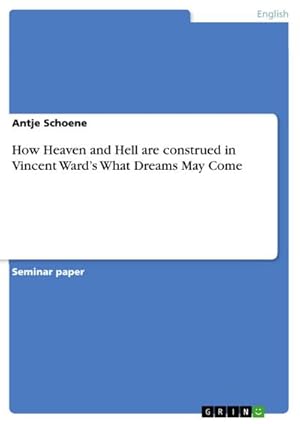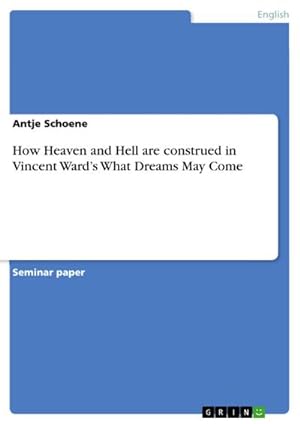heaven construed vincent ward¿s di schoene antje (2 risultati)
Tipo di articolo
- Tutti gli articoli
- Libri (2)
- Riviste e Giornali
- Fumetti
- Spartiti
- Arte, Stampe e Poster
- Fotografie
- Mappe
-
Manoscritti e
Collezionismo cartaceo
Condizioni
- Tutte
- Nuovi
- Antichi o usati
Legatura
- Tutte
- Rilegato
- Brossura
Ulteriori caratteristiche
- Prima edizione
- Copia autografata
- Sovraccoperta
- Con foto
- No print on demand (1)
Paese del venditore
Valutazione venditore
-
How Heaven and Hell are construed in Vincent Ward¿s What Dreams May Come
Editore: GRIN Verlag Apr 2010, 2010
ISBN 10: 3640602099ISBN 13: 9783640602094
Da: BuchWeltWeit Ludwig Meier e.K., Bergisch Gladbach, Germania
Libro Print on Demand
Taschenbuch. Condizione: Neu. This item is printed on demand - it takes 3-4 days longer - Neuware -Seminar paper from the year 2010 in the subject English Language and Literature Studies - Other, grade: 1,3, Dresden Technical University (Institut für Anglistik/ Amerikanistik), course: Science Fiction Films, language: English, abstract: 'When I was young, I met this beautiful girl by a lake.'The following paper focuses on how the afterlife is allegorized in Vincent Ward's film. Ward combines motifs from various religions. Ancient, Western and Eastern versions of afterlife merge to an individualistic Great Beyond. The leading literary influence seems to come from Dante's The Divine Comedy, especially considering the movie's depiction of Hell. Also several parallels to art work stand out. Of course, as no sources can prove it, it is just speculation if, especially the referred literature and paintings were an inspiration for the film. However, some parallels cannot be dismissed out of hand.For a clearer arrangement, I assembled the research paper in a Heaven (Chapter 2.1.) and a Hell (Chapter 2.2.) section and will then summarize my observations as well as explicate how this all fits into the science fiction genre (Chapter 3). Unfortunately, apart from various reviews on the internet, no other secondary text on What Dreams May Come can be found in literature. On that account, my paper mainly bases on the film itself and several reference books on theology, philosophy and mythology. Namely, The Oxford Companion to Philosophy and Boxton's The Complete World of Greek Mythology as reference books as well as work on afterlife: Coward's Das Leben nach dem Tod in den Weltreligionen and Braun's Das Jenseits - Die Vorstellungen der Menschheit über das Leben nach dem Tod. 28 pp. Englisch.
-
How Heaven and Hell are construed in Vincent Ward¿s What Dreams May Come
Editore: GRIN Verlag, 2010
ISBN 10: 3640602099ISBN 13: 9783640602094
Da: AHA-BUCH GmbH, Einbeck, Germania
Libro
Taschenbuch. Condizione: Neu. Druck auf Anfrage Neuware - Printed after ordering - Seminar paper from the year 2010 in the subject English Language and Literature Studies - Other, grade: 1,3, Dresden Technical University (Institut für Anglistik/ Amerikanistik), course: Science Fiction Films, language: English, abstract: 'When I was young, I met this beautiful girl by a lake.'The following paper focuses on how the afterlife is allegorized in Vincent Ward's film. Ward combines motifs from various religions. Ancient, Western and Eastern versions of afterlife merge to an individualistic Great Beyond. The leading literary influence seems to come from Dante's The Divine Comedy, especially considering the movie's depiction of Hell. Also several parallels to art work stand out. Of course, as no sources can prove it, it is just speculation if, especially the referred literature and paintings were an inspiration for the film. However, some parallels cannot be dismissed out of hand.For a clearer arrangement, I assembled the research paper in a Heaven (Chapter 2.1.) and a Hell (Chapter 2.2.) section and will then summarize my observations as well as explicate how this all fits into the science fiction genre (Chapter 3). Unfortunately, apart from various reviews on the internet, no other secondary text on What Dreams May Come can be found in literature. On that account, my paper mainly bases on the film itself and several reference books on theology, philosophy and mythology. Namely, The Oxford Companion to Philosophy and Boxton's The Complete World of Greek Mythology as reference books as well as work on afterlife: Coward's Das Leben nach dem Tod in den Weltreligionen and Braun's Das Jenseits - Die Vorstellungen der Menschheit über das Leben nach dem Tod.



